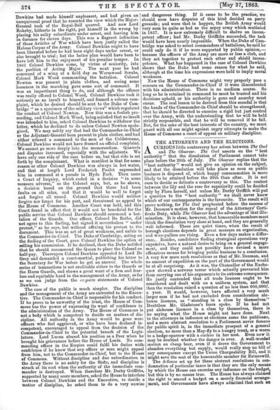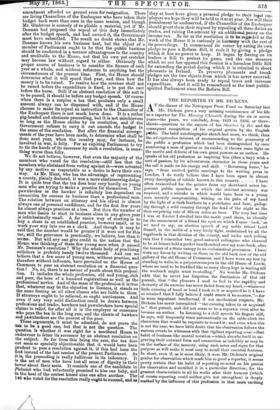THE ATTORNEYS AND THE ELECTIONS.
ACURIOUS little controversy has arisen between The.Owl and The Observer. The Owl asserts on the " best authority " that the dissolution of Parliament cannot take place before the 20th of July. The Observer replies that the "best authority" would not give an opinion on the subject, and that the dissolution will take place as soon as public business is disposed of, which happy consummation is more likely to be attained before the 20th than after. It is not ours to decide so delicate a controversy as this. The contest between the lily and the rose for superiority could be decided only by Flora herself, and unless Mr. Darby Griffith will put a question to the "best authority" we shall never know which of our contemporaries is the favourite. The result will prove nothing, for The Owl prophesied before the success of Mr. Denman's motion for the repeal of the Attorneys' Certi- ficate Duty, while The Observer had the advantage of that illu- mination. It is clear, however, that honourable members must think the dissolution very close at hand, and they are generally well informed. These are quiet times, when the result of borough elections depends in great measure on organization, and wire-pullers are rising. Even a few days makes a differ- encen, Besides, candidates finding strategical operations very expensive, have a natural desire to bring on a general engage- ment, and they could not possibly have devised a more efficacious means for bringing public business to a conclusion. A very few more such resolutions as that of Mr. Denman, and no amount of expedition on the part of the Government would be at all surprising. As it was, the Chancellor of the Exche- quer showed a nervous terror which actually prevented him from carrying one of his arguments to its extreme consequence. He justly contended that all trade licences ought to be considered and dealt with on a uniform system, and that then the resolution raised a question of no less than 600,0001. a year. It would, however have affected a very much larger sum if he had not excluded from consideration ale- house licences, as "standing in a class by themselves." Doubtless Mr. Gladstone's fears spoke. If he had not put alehouse licences in a class by themselves, there is no saying what the House might not have done. Next to the attorneys in influence at elections come the publicans, and a mere abstract resolution to a Parliament• never famous for public spirit is, in the immediate prospect of a general election, no more than a May-fly to a hungry trout, or a worm to a hedge-sparrow with a cuckoo in her nest. Even now it
may be doubted whether the danger is over. well-worded motion on cheap beer, even if it drove the Government to abandon everything but supply, would really stop no bill of any consequence except the Union Chargeability Bill, and it might save the seat of the honourable member for Eatanswill.
The defence set up for these abstract resolutions in con- demnation of particular taxes is that they are the only means by which the House can exercise any influence on the budget, but this is by no means true. The House has always claimed the right to amend a budget on a merely financial arrange- ment, and Governments have always admitted that such an
amendment afforded no ground even for resignation. There are living Chancellors of the Exchequer who have taken their budget back more than once in the same session, and though Mr. Gladstone is scarcely of so pliable a material, yet if Mr. Denman had proposed the repeal of this duty immediately after the budget speech, and had carried it, the Government must have submitted. The result no doubt shows that Mr. Denman knows his own business best, but the object of a member of Parliament ought to be that the public business should be conducted in a manner advantageous to the country and creditable to the House, not that his own pet crotchet may become law without regard to either. Obviously the proper course of business is to consider the finance of each year as a whole, and without reference to anything but the circumstances of the present time. First, the House should determine what it will spend that year, and then how the money is to be raised. To resolve how the revenue shall not be raised before the expenditure is fixed, is to put the cart before the horse. Still if an abstract resolution of this sort is to be passed, it should be before any budget speech. Of course when there is a surplus a tax that produces only a small amount always can be dispensed with, and if the House chooses to make its repeal an instruction to the Chancellor of the Exchequer there is not much harm done. It is a rather pig-headed and obstinate proceeding, but it is not mischievous so long as the House abides by its resolution, and if the Government refuses to carry it out amends the budget in the sense of the resolution. But after the financial arrange- ments' of the year have been made, to determine what shall be done next year, when the country may, for instance, be involved in war, is folly. For an expiring Parliament to try to tie the hands of its successor by such a resolution, is some- thing worse than folly.
We do not believe, however, that even the majority of the members who voted for the resolution—still less that the members who abstained from voting against it—were actuated by any motive so respectable as a desire to have their own way. As Mr. Hunt, who has the advantage of representing a county, plainly declared, it was a mere electioneering dodge. It is quite true that the tax does bear very hardly on young men who are trying to make a practice for themselves. The pawnbroker or the hawker is infinitely less dependent on connection for success in business than a professional man. The relation between an attorney and his client is almost always one of personal confidence, and for the first few years he almost always practises at a loss. But then the number of men who desire to start in business alone in any given year is infinitesimally small. A far easier way of starting is to buy a share in an established practice, however small, or to work your way into one as a clerk. And though it may be said that the number would be greater if it were not forthis tax, still the grievance is practically, we believe, lees than it seems. But will any one give credit to the notion that the House was thinking of these few young men when it passed Mr. Denman's resolution ? Why the whole body of practising solicitors is probably barely twelve thousand. And can we believe that a few score of young men, without practice, and therefore without influence, have prevailed on the House of Commons to pass an abstract resolution on a financial ques- tion ? No, no, there is ne savour of youth about this proposi- tion. It includes the whole profession, old and young, rich and poor, the hero of a hundred registrations as well as the professional novice. And of the mass of the profession it is true that, whatever may be the objection to licences, it stands on the same footing as all other classes who are liable to them. If attorneys ought to be relieved, so ought auctioneers. And even if any very solid distinction could be drawn between professions and trades, hawkers and pawnbrokers have special claims to relief, for after all it is the employer or consumer, who pays the tax in the long run, and the clients of hawkers' and pawnbrokers are the poorest of the poor. These arguments, it must be admitted, do not prove the 'tune to be a good one, but that is not the question. The question is Whether it was right for a moribund House to endeavour to fetter its successor by an abstract resolution on the subject. So far from this being the case, the tax does not seem so specially objectionable that it would have been prudent to pass a resolution against it, if this had been the first instead of the last session of the present Parliament. As it is, the proceeding is really ludicrous in its indecency. It Is the act of men who have lost all sense of dignity in their terror about their seats. It reminds one of the candidate in Pickwick who had reluctantly promised to kiss one baby, and in the heat of the contest kissed nine one after another. The 146 who voted for the resolution really ought to succeed, and as they at least have given a personal pledge to their legal em- ployers we hope they will be held to it next year. Nor will their punishment be undeserved, if the Chancellor of the Exchequer should grant them their request by repealing all these duties on trades, and raising theoamount by an additional penny on the income-tax. So far as the resolution is to ber regarded as the work of the House it is curiously in harmony with the rest of its proceedings. It commenced its career by eating its own pledge to pass a Reform Bill, it ends it by giving a pledge which it has no power to keep. It began by forcing on its leaders a Bill to protect its game, and the one measure which no one has opposed this Session is a harmless little Bill for extending the period during which it is criminal to shoot pheasants in Ireland. To preserve pheasants and break pledges are the two objects from which it has never swerved. It has also always been ready to repeal taxes and increase expenditure. And it will be remembered as the least public- spirited Parliament since the Reform Bill.



































 Previous page
Previous page